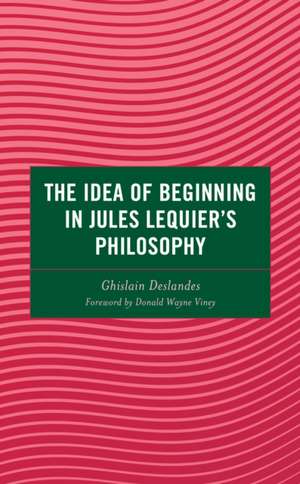The Idea of Beginning in Jules Lequier's Philosophy: Continental Philosophy and the History of Thought
Autor Ghislain Deslandesen Limba Engleză Hardback – 15 feb 2023
Preț: 527.74 lei
Preț vechi: 685.38 lei
-23% Nou
100.100€ • 105.05$ • 83.38£
Carte tipărită la comandă
Livrare economică 14-28 aprilie
Specificații
ISBN-10: 1666927201
Pagini: 150
Dimensiuni: 157 x 235 x 13 mm
Greutate: 0.38 kg
Editura: Lexington Books
Seria Continental Philosophy and the History of Thought
Descriere
The Idea of Beginning in Jules Lequier's Philosophy analyzes the work of an author mostly unknown in Anglophone countries, but who greatly influenced the trajectory of French philosophy over the last two centuries.
Jules Lequier, in The Search for a First Truth, argues that beginning such a search is the goal towards which philosophy must tend. To achieve this, Lequier established a postulate, that of freedom against necessity, and set out a program as an inaugural gesture: "TO MAKE, not to become, but to make, and, in making, TO MAKE ONESELF." By the fertility of possible beginnings, the making in Lequier is always first and radical.
As Ghislain Deslandes reveals in this exploration of Lequier's work, that something new is possible in philosophy after all, and that it should even be possible to invent it in other fields, applying the principle that "everything is to be relearned, and started again, but in another truth." Deslandes explores parallels between the "classical" antiphilosophers Pascal and Kierkegaard and Lequier, whose importance to French philosophy is today better documented and more widely recognized.













